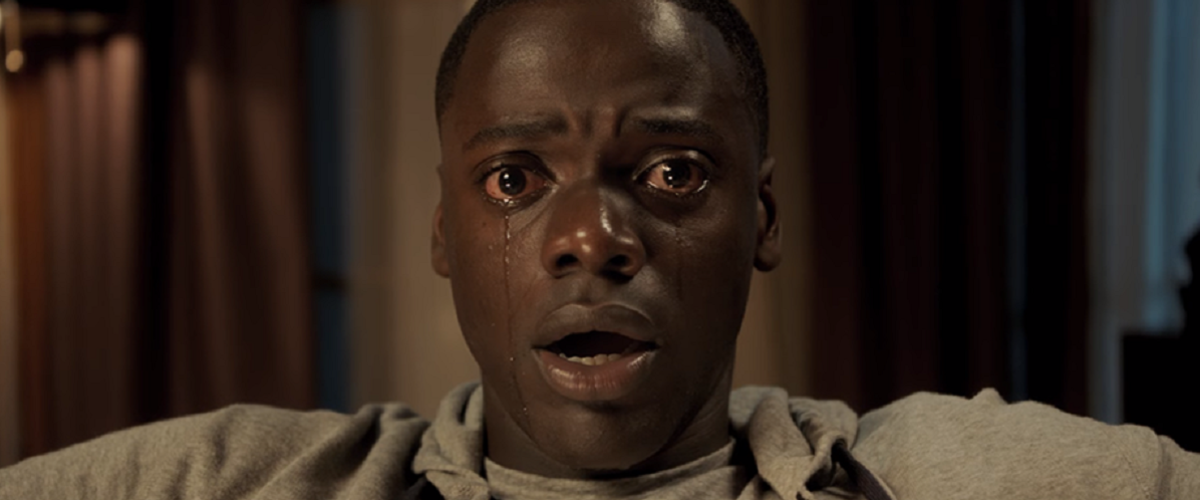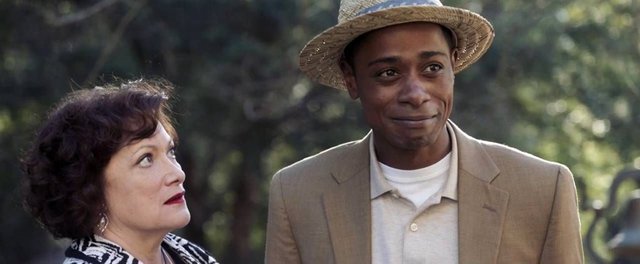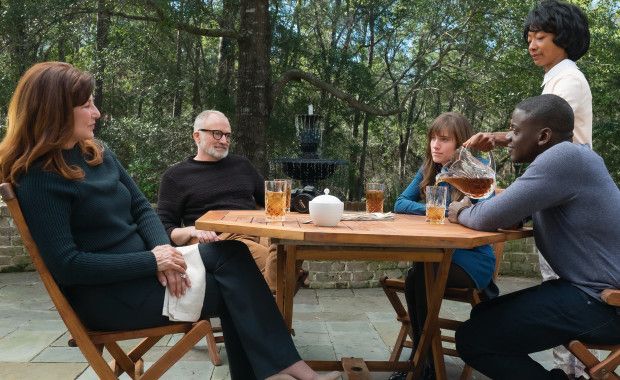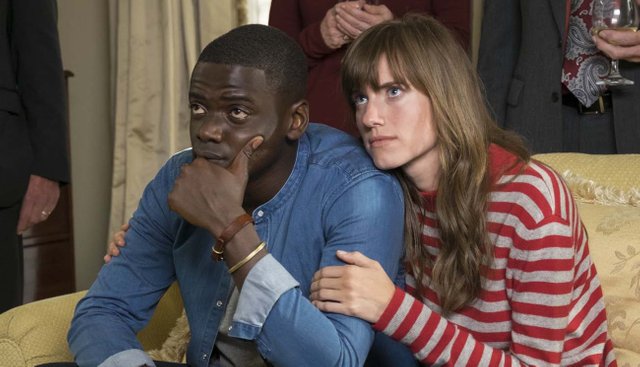GET OUT - a film about racism
Why does a comedian make a horror movie?
Jordan Peele dived to offer something quite different to the audience, and more importantly, something quite relevant. Considering that “Get Out” is Peele's director's debut (but, what a debut!), it makes his move even braverWe are tempted to answer this with "Why not?", But we will offer a better explanation. Although at first glance may not work that way, horror and comedy have a lot in common. One of the main intentions of both genres is to trigger specific audience reactions - horror is expected to disturb you in some way, comedy to make you smile. In this regard, horror and comedy mostly have a reputation for light entertainment, films whose role is fulfilled, if the desired reaction is challenged. However, precisely because of the attractiveness of these genres to the general public, they can be used as metaphors, satire or in some other way used to approach various social, anthropological and psychological issues. They can force you to wonder why it is the thing you've been watching so much funny (or not at all) or why it has disturbed you so much (or not) and thus transmit a more serious message or point to an important social problem. Therefore, it may not be that much of surprise the genre that Jordan Peele chose, as someone who is primarily referred to as a comedian, but the motivation for such a decision should be sought in the subject of the film. That the choice of horror as a genre that transmits a message about some kind of discrimination and inequality is not so unusual proves the “Rosemar's baby” and” Stepford's wives” which were,by Peele’s words, the inspiration for the film(both films are adaptations of Irene Levin's novel). These are the movies that, among other things , deal with gender inequalities, and like “Get Out”, try to present you with quite real fears that some people face daily.

Get Out
The main character of the film “Get Out”, Chris Washington ( Daniel Kaluuya) is a photographer of an African-American origin who is related to a white woman named Rose Armitage (Allison Williams). The two of them leave for the first time to visit Rose's parents to spend the weekend and Chris is a little nervous about it, although Rose assures her parents are not at all racist, so that her father would vote for Barack Obama and for the third time if he could. When the couple arrives at the Armitage House, very quickly, Rose's father mentions his political commitment and is generally very friendly. Although Bradley Whitford's attempts to make the cool atmosphere seem a bit unpleasant, Chris seems to be very welcome, although two of the servants (black people) - Georgina (Betty Gabriel) and Walter (Marcus Henderson), who behave very cold and mechanical, are the first hint of strange events in the house of the Armitages. The dinner joined Rose's brother Jeremy (Caleb Jones), who, unlike his parents, does not strive to be too kind to his sister's boyfriend. The nervousness that Chris felt before getting to know Rose's parents the day after their arrival proves to be justified - the Armitages organize a party where all the guests are apart from a wealthy whites who are overly kind to the main character and are interested in "his afro-American experience". The mystery is only getting deeper when Chris is able to take a picture of Logan, the only dark guest at the party, and send the picture to his best friend, Rod , who, beeing the worker of the TSA (Transportation Security Administration), finds out Logan's true name of Andrew and that he disappeared. This is roughly everything you need to know about the action of the movie before you look at it. If you are interested in what is so mysterious and horrible about visiting your parents - do not watch a trailer. Even if it does not reveal a complete story, it spiols a lot.

Jordan Peele said that he wanted Get Out to be a movie that you have to watch twice in order to catch up with all the hints of the craft. They are indeed present in the form of incidental comments since the Armitages show Chris's house, and the balance between indicating something and discovering everything is timely, which Peele, as scriptwriters and actors, achieved by their performance, points to great skill. On the one hand, in this way, tension is maintained in the film, and on the other hand, the audience is given enough time to consider individual scenes and parts of the dialogue for themselves (although despite the subtle hints they easily miss out on the first viewing), and not only in the context of the ultimate solution to the mystery, which is one big metaphor.
In addition to this tension and horror atmosphere that is dominated by much of the film, although it is present in the form of physical violence only at the very end (unlike a large number of contemporary horror films that seem to compete in which will be more dreadful), Get Out impresses with its stratification. In a conversation between Chris and Rose's mother, Missy, we find out that his mother was killed in a car accident while he was a child. Chris feels great guilty because he was sitting at home while it was happening and did not call for help, although he was aware that his mother had long been away - he believes she might have survived if the ambulance was sent on time. A little later, we see the scene of Rod sitting at his house and doing nothing, although he was already seriously concerned about Chris, who was really in danger at Armitage.

Racism is not only intolerance
As we have already said, Get Out deals with racism directed against Afro-Americans, but as a classic example of racist procedure , only one scene can be considered, at the beginning of the film. On his way to Rouse's parents, Chris and Rose, who is in the driver's seat, ride on a deer and when the police arrive, the police are searching for personal documents of Chris, although he did not drive, so Rose angrily defends him. However, even this scene is here to indicate how much Rose tried to earn the trust of Chris (especially when he commented that her reaction was very sexy), not so much to show racist behavior of law and order.
The more important subject of the film and what is not talked about enough because it is often not considered racism is reflected in the overly courteous behavior of the Armitages and their guests at the party. The fact that somebody likes to say that he voted for Obama and is interested in someone's "afro-American experience", no matter how well-intentioned (spoiler: in this film it's not really) does not change the fact that this person looks different to someone who has different skin color. Absence of racism is not a mere tolerance for someone whose skin is darker than yours, but the realization that his or her skin color does not make that person. As Danijel Kaluja, actor himself, says that by such an invasive and artificial kind of behavior you show that you regard somebody's skin color as a primary characteristic of that person, which, although less aggressive than racist intolerance, continues to constitute discrimination.
This shallow vision of dark-skinned people is probably best represented by the image of Jim Hudson (Stephen Ruth), a blind art critics - if you did not watch the movie, we warn you that follows the big spoiler. Jim, like all guests at the Armitage party, is here to compete for the transplantation of his own brain into the body of Chris. Unlike most others who want this because they think they will become physically superior, healthier or simply more cool, Jim, who has not always been blind, just wants Chris's eyes to get Chris's talent. Although it may be metaphorically to say that someone has a "good eye", it is clear that it is not enough to have only two high-quality visual organs that someone would be a good photographer. Although for Jim Hudson, the color of Chris's skin is irrelevant, he still reduces his talent to a physical attribute-similar to what other Armitage clients expect to possess the traits of their unusual donors when they are in their bodies (although in his case the metaphor may have general meaning and not only relate to racism towards African Americans).
Alternative (and controversial) ending
If you still haven’t watched a movie and do not like spoilers, we recommend that you skip the rest of the text and come back after you have seen a movie. The controversy caused by the movie “Get Out” could have been even greater if Jordan had kept the end he had originally had in mind. In the original version, Chris should have killed all members of the Armitage family and even Rose, but this would have consequences. Given the fire that broke out in the house during the battle between Chris and Jeremy, all the evidence would have been burned, and no one would have believed in Chris's crazy story of a family that transplants the brains of the whites in the bodies of blacks. This end, of course, sends a very clear message about the relationship of the legal system to the Afro-Americans, which is just hinted in the scene with a policeman. Although, it is likely that the Rodd is also exposed when asked for assistance in the police station by less subtle messages, especially since the detectives are turning dark. Coco is still pleased to think that the end we have watched leaves the hope of the fight against racism.
